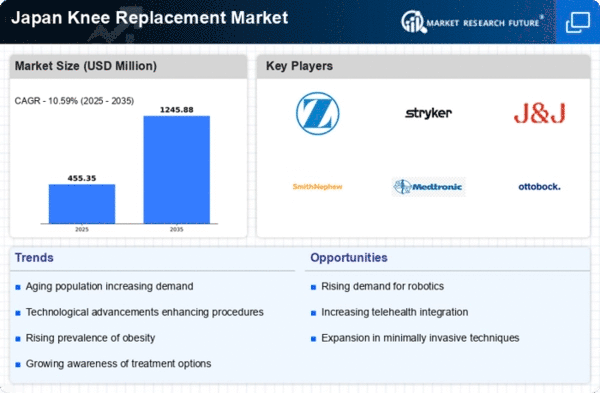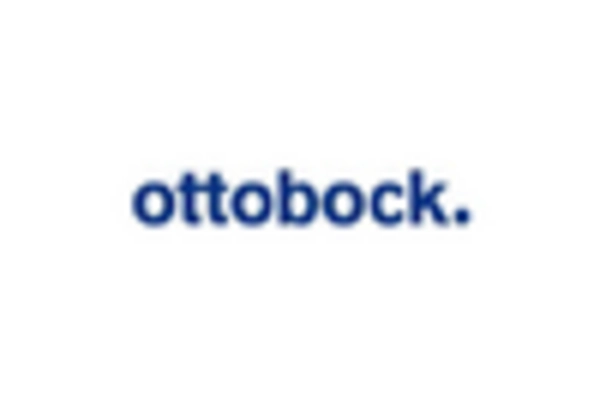Rising Healthcare Expenditure
Japan's increasing healthcare expenditure is a significant driver for the knee replacement market. As the government allocates more resources to healthcare, the availability of funds for orthopedic procedures, including knee replacements, is improving. In 2025, healthcare spending is projected to reach approximately ¥42 trillion, reflecting a commitment to enhancing patient care. This rise in expenditure is likely to facilitate better access to advanced surgical options and rehabilitation services, thereby promoting the growth of the knee replacement market. As patients gain access to improved healthcare services, the demand for knee replacements is expected to rise correspondingly.
Increased Awareness and Education
There is a growing awareness regarding knee health and the benefits of knee replacement surgeries in Japan. Educational campaigns by healthcare providers and organizations are informing the public about the options available for treating severe knee pain. This increased awareness is likely to drive more patients to seek consultations and consider knee replacement as a viable option. The knee replacement market is benefiting from this trend, as more individuals are recognizing the potential for improved quality of life post-surgery. Additionally, the rise of online health resources and patient support groups is facilitating informed decision-making among potential candidates.
Government Initiatives and Funding
Government initiatives aimed at improving healthcare access and affordability are influencing the knee replacement market in Japan. Recent policies have focused on increasing funding for orthopedic surgeries, including knee replacements, thereby reducing the financial burden on patients. This support is crucial, as the average cost of a knee replacement surgery can exceed ¥1,000,000. With government backing, more patients may be encouraged to undergo these procedures, leading to a projected increase in the number of surgeries performed annually. Such initiatives are likely to enhance the overall growth trajectory of the knee replacement market.
Rising Incidence of Osteoarthritis
The increasing prevalence of osteoarthritis in Japan is a critical driver for the knee replacement market. As the population ages, the incidence of osteoarthritis, a degenerative joint disease, rises significantly. It is estimated that approximately 30% of individuals aged 65 and older in Japan suffer from this condition, leading to a growing demand for knee replacement surgeries. The knee replacement market is likely to experience substantial growth as more patients seek surgical interventions to alleviate pain and restore mobility. Furthermore, the economic burden associated with osteoarthritis management, including medication and physical therapy, may push patients towards considering knee replacement as a more viable long-term solution.
Advancements in Surgical Techniques
Innovations in surgical techniques are transforming the knee replacement market in Japan. Minimally invasive procedures, such as arthroscopic surgery, are gaining traction, allowing for quicker recovery times and reduced hospital stays. These advancements not only enhance patient outcomes but also increase the overall efficiency of healthcare systems. The introduction of robotic-assisted surgeries is also noteworthy, as it improves precision and reduces the risk of complications. As these technologies become more widely adopted, the knee replacement market is expected to expand, with a projected growth rate of around 8% annually over the next five years.
















